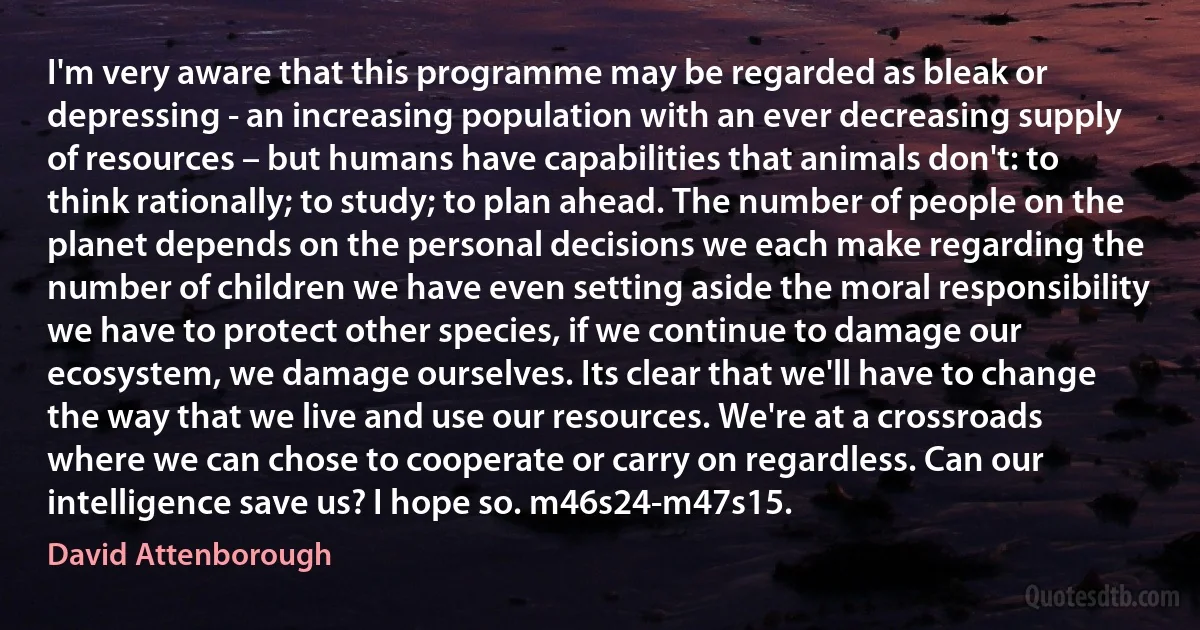Supply Quotes - page 8
There is little doubt that the observation that quality may depend on price (productivity on wages; default probability on interest rates) has provided a rich mine for economic theorists: A simple modification of the basic assumptions results in a profound alteration of many of the basic conclusions of the standard paradigm. The Law of Supply and Demand has been repealed. The Law of the Single Price has been repealed. The Fundamental Theorem of Welfare Economics has been shown not to be valid.
More than that, the theories that we describe here provide the basis of progress toward a unification of macroeconomics and microeconomics. They pro vide an explanation of unemployment and credit rationing, derived from basic microeconomic principles. It is a theory in which the extensive idleness that periodically confronts society's resources, human and capital, is seen as but the most obvious example of market failures that prevasively and persistently distort the allocation of resources.

Joseph Stiglitz
Hashemi Rafsanjani: Take Palestine, for example. We give support to the mujahideen in Palestine. Are they Shiites? No, they are Sunnis. Moreover, they are zealous Sunnis. Hamas is zealous with regard to Sunni Islam, but because of their Jihad and resistance, we supply them with aid. Likewise, when we supplied support in Bosnia-Herzegovina and Kosovo – were they Shiite? It's not like that. Similarly, in Afghanistan, when we gave supported to the Jihad of the mujahideen, we support all the groups – Sunni and Shiite alike – as much as we could. In the Iraq of Saddam Hussein, many of our Sunni brothers found refuge in Iran, just like the Shiite brothers. In Lebanon as well, we gave support when Israel invaded Lebanese territories and occupied them. We gave support to whoever resisted the Israeli occupation in Lebanon. The late sheik Sa'id Sha'ban, who was a close friend of Iran – was he Shiite? He was a Sunni scholar. It's not like that. It is not part of our plan...

Hashemi Rafsanjani
We promised the Europeans freedom. It would be worse than dishonorable not to see that they have it. This might mean war with the Russians, but what of it? They have no air force, and their gasoline and ammunition supplies are low. I've seen their miserable supply trains; mostly wagons drawn by beaten up old horses or oxen. I'll say this; the Third Army alone and with damned few casualties, could lick what is left of the Russians in six weeks. You mark my words. Don't ever forget them. Someday we will have to fight them and it will take six years and cost us six million lives.

George S. Patton
Why... are there any market transactions at all? Why not all production carried on by one big firm?... First, as a firm gets larger, there may be decreasing returns to the entrepreneur function, that is, the costs of organizing additional transactions within the firm may rise... Second, it may be that as the transactions which are organized increase, the entrepreneur fails to place the factors of production in the uses where their value is greatest, that is, fails to make the best use of the factors of production... Finally, the supply price of one or more of the factors of production may rise, because the "other advantages" of a small firm are greater than those of a large firm.

Ronald Coase
It's like a supply and demand thing. It's like 'Well, this is what they want me to do, this is what they want to hear. So I'll do more of this, cuz this is great... and they love me.' Suddenly people start giving you money as well. So then you've got money and you get used to this lifestyle. And you don't wanna take any risks 'cause they've got you by the balls, and you've got all these little things that you've bought, or you're attached to. And you start spending all this money... And that's how they get ya!

Thom Yorke
Hidden in hollows and behind clumps of rank brambles were large tents, dimly lighted with candles, but looking comfortable. The kind of comfort they supplied was indicated by pairs of men entering and reappearing, bearing litters; by low moans from within and by long rows of dead with covered faces outside. These tents were constantly receiving the wounded, yet were never full; they were continually ejecting the dead, yet were never empty. It was as if the helpless had been carried in and murdered, that they might not hamper those whose business it was to fall to-morrow.

Ambrose Bierce
L. Walras first formulated the state of the economic system at any point of time as the solution of a system of simultaneous equations representing the demand for goods by consumers, the supply of goods by producers and the equilibrium condition that supply equal demand on every market.

Kenneth Arrow
The relationship of the suppliers and users of knowledge to the knowledge they supply and use is now tending, and will be increasingly tend to, to assume the form already taken by the relationship of commodity producers and consumers to the commodities they produce and consume--that is, the form of knowledge.

Jean-François Lyotard
The Beer Shops licensed to have the Beer drunk on the Premises, are a Pest to the Community. They are Haunts of Thieves and Schools for Prostitutes. They demoralize the lower Classes. I wish you would turn your mind to consider Whether this Evil could not be abated. That Beer should be sold like anything Else, to be taken away by the Purchaser to be consumed at Home is most reasonable and the more People are enabled so to supply the labouring Classes the better, but the words "licensed to be drunk on the Premises” are by the common People interpreted as applicable to the Customers as well as to the Liquor, and well do they avail themselves of the License.

Henry Temple, 3rd Viscount Palmerston
Whereas originally the hopes for string theory, and its descendants, were that some kind of uniqueness would be arrived at, whereby the theory would supply mathematical explanations for the measured numbers of experimental physics, the string theorists were driven to find refugee in the strong anthropic argument in an attempt to narrow down an absolutely vast number of alternatives. In my own view, this a very sad and unhelpful place for a theory to find itself.

Roger Penrose
The most terrifying fact about the universe is not that it is hostile but that it is indifferent; but if we can come to terms with this indifference and accept the challenges of life within the boundaries of death - however mutable man may be able to make them - our existence as a species can have genuine meaning and fulfillment. However vast the darkness, we must supply our own light.

Stanley Kubrick
If man merely sat back and thought about his impending termination, and his terrifying insignificance and aloneness in the cosmos, he would surely go mad, or succumb to a numbing sense of futility. Why, he might ask himself, should he bother to write a great symphony, or strive to make a living, or even to love another, when he is no more than a momentary microbe on a dust mote whirling through the unimaginable immensity of space?...
Those of us who are forced by their own sensibilities to view their lives in this perspective - who recognize that there is no purpose they can comprehend and that amidst a countless myriad of stars their existence goes unknown and unchronicled - can fall prey all too easily to the ultimate anomie. ... The world's religions, for all their parochialism, did supply a kind of consolation for this great ache ... This shattering recognition of our mortality is at the root of far more mental illness than I suspect even psychiatrists are aware.

Stanley Kubrick
It was a global depression, had many causes, the whole story requires you to look at the whole international system. But policy errors in United States, as well as abroad, did play an important role. And in particular as I said, the Federal Reserve failed in this first challenge in both parts of its mission. It did not use monetary policy aggressively to prevent deflation and the collapse in the economy, so it failed in its economic stability function. And it didn't adequately perform its function as lender of last resort allowing many bank failures and a resulting contraction in credit and also with the money supply. So, in that respect, again, the Fed did not fulfill its intended mission.

Ben Bernanke
At the beginning of World War II the U. S. had a mere 600 or so first-class fighting aircraft. We rapidly overcame this short supply by turning out more than 90,000 planes a year. The question at the start of World War II was: Do we have enough funds to produce the required implements of war? The answer was No, we did not have enough money, nor did we have enough gold; but we did have more than enough resources. It was the available resources that enabled the US to achieve the high production and efficiency required to win the war. Unfortunately this is only considered in times of war.

Jacque Fresco



